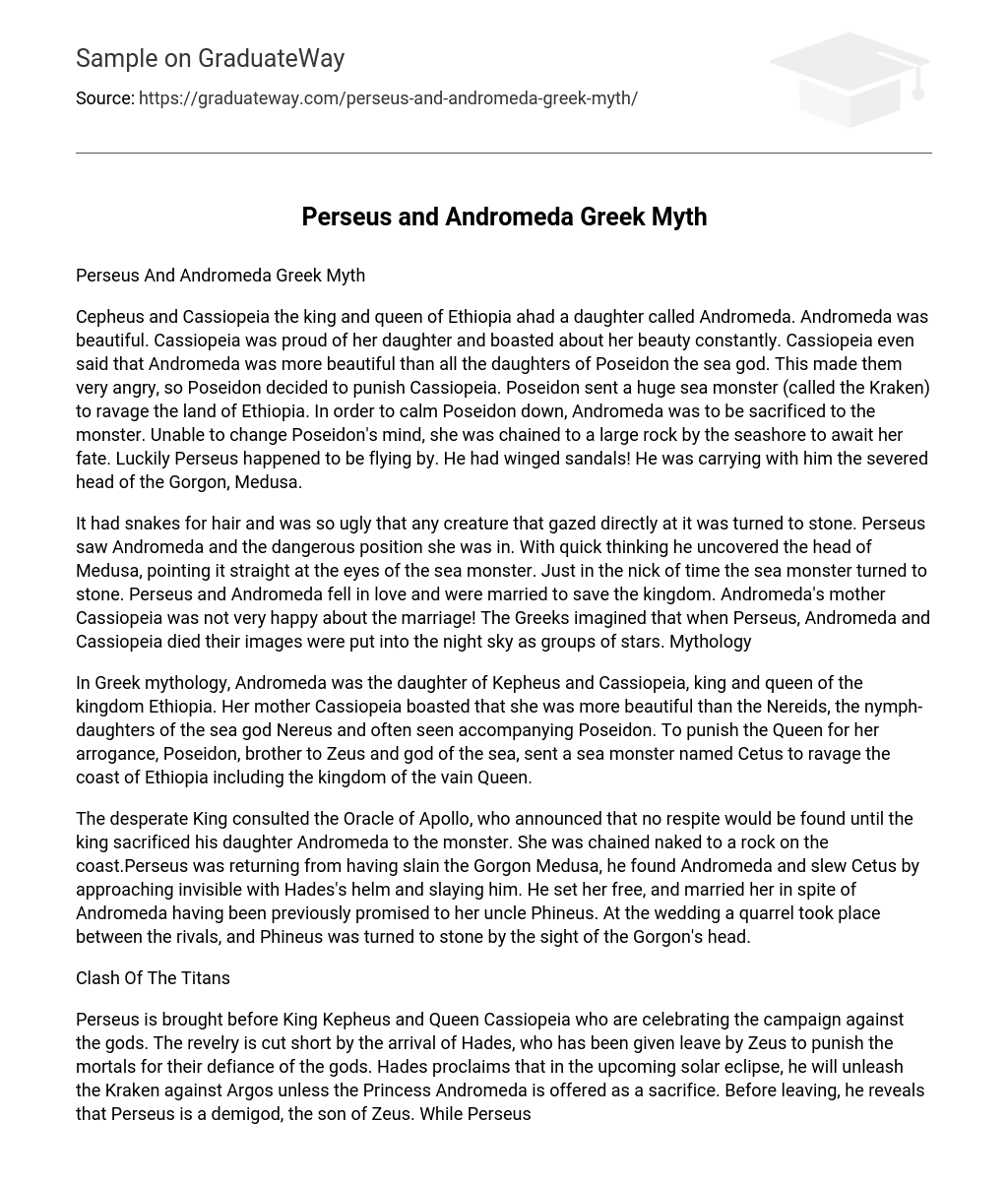Perseus, a brave Greek hero, encountered a fearsome creature with serpents as hair. This hideous beast had the ability to turn any living being into stone just by looking at them. Perseus quickly came up with a plan when he saw Andromeda in great danger and trapped. He showed the severed head of the monstrous Medusa to the sea monster, making its eyes meet Medusa’s gaze. Just in time, the sea monster turned into stone. As a result, Perseus and Andromeda fell deeply in love and decided to get married in order to save their kingdom.
However, Andromeda’s mother, Cassiopeia, was not happy with this marriage at all. According to Greek mythology, when Perseus, Andromeda, and Cassiopeia died, they were immortalized as constellations in the night sky.
In Greek mythology, Andromeda was the daughter of Kepheus and Cassiopeia. Kepheus and Cassiopeia were the king and queen of Ethiopia. Cassiopeia believed that she was more beautiful than the nymph-daughters of Nereus, known as the Nereids, who frequently accompanied Poseidon. As a consequence of her hubris, Poseidon – Zeus’ brother and god of the sea – dispatched a sea monster named Cetus to assault Ethiopia’s coastline with a specific focus on Queen Cassiopeia’s kingdom.
According to the Oracle of Apollo, the desperate King received a message that he needed to sacrifice his daughter Andromeda to the monster in order to find relief. Andromeda, who was naked, was chained to a rock on the coast. While Perseus was returning from killing Medusa, he came across Andromeda and used Hades’s helm to approach and kill Cetus without being seen. After freeing her, Perseus married Andromeda despite her previous promise to her uncle Phineus. At their wedding, a dispute arose between the rivals, leading to Phineus being turned into stone upon seeing the Gorgon’s head.
Clash Of The Titans
Perseus is presented before King Kepheus and Queen Cassiopeia during their celebratory event after their successful campaign against the gods. The festivities are interrupted when Hades arrives, granted permission by Zeus to punish the mortals for defying the gods. Hades declares that he will release the Kraken upon Argos during the upcoming solar eclipse unless Princess Andromeda is offered as a sacrifice. Before departing, Hades reveals that Perseus is a demigod, being Zeus’ son.
While Perseus is returning to Argos by flight after decapitating Medusa, Andromeda finds herself deceived by her servant, Ammon. Ammon convinces her to escape from the Royal Palace in order to avoid being sacrificed by Prokopion and the people of Argos who intend to protect their city from suffering at the hands of the Kraken. Seeking revenge for leading Andromeda into danger, Peshet, Andromeda’s personal maid, kills Ammon but also loses her own life in doing so.
After successfully defeating the Kraken, Perseus plunges into the sea and saves Andromeda, who now reigns as Queen of Argos. She implores him to become her King but he declines stating that he is not a leader; rather, he sees himself simply as a man.
Her people will respect her as their Queen. After defeating the Kraken and Hades, Andromeda falls into the sea and Perseus jumps in to save her. When he reaches her, he passionately kisses her, revealing their mutual love. Upon reaching the shore, Andromeda asks Perseus if he will stay, but he explains that there is someone he needs to speak to before kissing her again and assures her of his return.
Riding on Pegasus, Perseus flies to Mount Olympus where he confronts Zeus expressing his desire not to be a part of the gods and declaring that their conflict has just begun. He forcefully thrusts his sword into the Gods’ map breaking the models representing each living person before departing. Later, he is seen flying on Pegasus over the sea presumably heading back to Argos.





